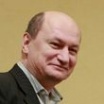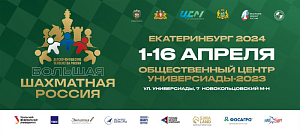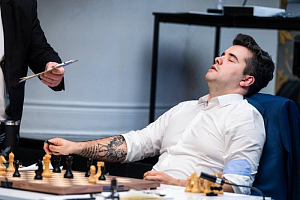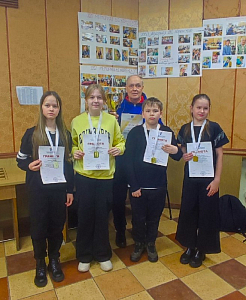Person of day - 8 APRIL 2024
OLEG PERVAKOV

Oleg Viktorovich Pervakov was born on 8thApril in Kirov. He began to study chess at the local Pioneer’s Palace, where he was taught by a master Mikhail Shahov. He played for the team from Kirov in the Soviet championship of Pioneer’s Palaces. After school, Oleg enrolled in the Bauman Institute in Moscow. That same year, in 1977, he made his debut as a composer of chess problemsand studies.
“My debut in composing studies came in 1977 on the pages of Chess in USSR magazine. Alas, one of the best chess composers of the USSR, Mikhail Rolnik from Nizhny Tagil, found a subtle rebuttal in my study. One year later, I met Anatoly Kuznetsov, the editor of the “Compositions” columns in that magazine, and offered to amend my draft, but my second one was also defunct.
While studying at the Bauman Institute and performing for the chess team at students’ competitions and at individual competitions of Burevestnik, I had little time to compose studies. Only in 1983 did my second study emerge into the light- and it was immediately successful, splitting 1st-2ndplaces with Genrikh Kasparyan.
At that time, chess classes at the Bauman Institute were led by master Sergey Sokolov- who would later be killed in cruel fashion in the 1990s in a train from Warsaw to Moscow for a few thousand dollars- with the help of Tamara Kasymova, the wife of Igor Zaitsev. She was the one who offered to show my study to Igor Arkadyevich. After the grandmaster’s approval, this study was published in the Bulletin of the Central Chess Club of the USSR.
After graduating from university, I met Moscow’s leading composers of studies and problems - N. Kralyn, E. Pogosyants, K. Sumbatian, E. Umnov, Y. Vladimirov, A. Gulyaev…I began to attend composer’s Mondays in the Central Chess Club regularly. But, as a composer of studies, I learned the most from A. Kuznetsov, whom I consider my mentor. In those years, publication of a study in Chess in USSRwas already considered a success, since Kuznetsov’s standards were so high. He looked after us youngsters with discipline and love, rejoicing at our artistic achievements as if they were his own.” (O. Pervakov)
In total, he published about 150 studies, 90 of which won acclaims and 20 of which won first prizes. In 2005, he became a grandmaster in chess composition. He is a three-time world champion for chess composition (in 2004-2006, 2007-2009 and 2016-2018) and a two-time national champion (in 1985-1986 and 1987-1988). He is the deputy chairman of the Commission for chess composition of the Russian Chess Federation.
Oleg Pervakov is a respected chess journalist and executive editorof the 64-Chess Reviewmagazine. Oleg has worked with Russia’s foremost chess magazine for longer than 20 years! Originally, he was assigned to a laboratory that used to be headed by Sakharov at the Kurchatov Institute for Atomic Energy. In 1995, Alexander Roshal invited the celebrated chess composer to join his editorial team. From that moment on, multiple renowned grandmasters who come to the office of 64head to Oleg Pervakov first of all in the hope of seeing new studies.
There are several works devoted to Pervakov, such as Oleg Pervakov’s Magical Studies, written in Dutch, and a chapter of Tibor Károlyi’s Genius in the Background. He wrote Studies for Practical Playerswith a recognised trainer of the USSR Mark Dvoretsky. He is the editor and composer of the collection of chess studies of Vasily Smyslov, the 7thworld champion, as well as the editor of dozens of chess books. He has organised and refereed multiple chess competitions around the world and he is the chief editor of the studies section of Chess Problemsmagazine.
“Alas, 6-piece bases and computer programs that were designed to help composers in analysis are often used as a blind instrument of composition. One looks at some “works” and wonders…an unorganised 20-30-nx10 move games with pseudo-options, positioning draws, false trails and other ideas for studies…
Wonderful! But understanding what is happening on the board, why pieces move there and not elsewhere is often even beyond world champions! Tell me, who needs these studies beside self-infatuated authors? People who haven’t composed a single study in their lifetimes have already moved into 6-figure compositions. In all likelihood, soon people who can’t even play chess will follow them…” (O. Pervakov)


















